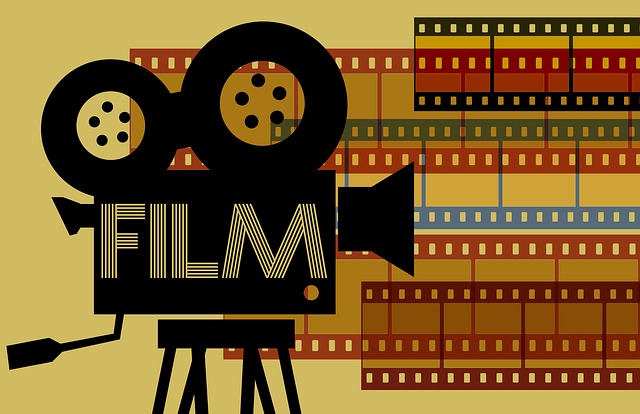Welcome–this is the film industry. And you want to learn how to get started in the film industry? Abandon hope, all ye who enter here, for it is more cutthroat and work than you will ever get credit for doing. Imagine working roughly 13-hour workdays. Every weekend. For a month…followed by stressful days in the editing room. Suddenly the exported product will finally be showcased in a dim theatre to an audience of other students who did the exact same thing with the exact same passion and the exact same dream. And yet, all you feel is your heart doing a funny little jig as the lights dim and the whir of the projector starts. The big screen welcomes you into a story, your story.
So you wanna make movies, huh? But from internships to networking to which position works best for you, you have a lot to consider.
Wondering how to get started in the film industry? Prepare to launch yourself to Steven Spielberg level fame.
FILM INDUSTRY POSITIONS

First off, you need to figure out what you want to do. Filmmaking, yes, but what about filmmaking exactly? You’ll find so many things you can do, and though you may not get the prestige of Steven Spielberg, you are still vital to the filmmaking process.
Scriptwriter/Screenwriter: Person who creates the plot of the movie or TV show. Everybody is a storyteller, all of them adding up to the big finale, but these experts are the OG pen-to-paper visionaries.
Producer: Person who handles the finances of a movie. Every cent planned and spent from the beginning stages until the final release is on the producer.
Director: Person who supervises the entire movie hierarchy to create her/his vision. It is the duty of the director to determine and realize the vision of the screenplay from paper to screen. All with the wonderful help of the designers, crew and actors.
Cinematographer: Person in charge of camera and light to create the director’s vision. Also known as the DP or Director of Photography, these folks control how the image ends up looking on camera.
Sound Designer: Person in charge of designing, recording or assembling the movie’s sound. Half the movie stems from the sound, so a truly immersive experience has the SFX to bring the audience in.
Production Designer: Person in charge of design style for sets, props, costumes. This person determines the aesthetics of the film, and figures out how to represent that through subtle displays on set.
Editor: Person who splices the film together. This person will make or break a story. All the little pieces are brought together in the editing room and the story changes based on how scenes are organized.
And this doesn’t account for all the sub-roles and divisions in the hierarchy that adds up to movie-making. But, in an I-have-$56.32-to-fund-this-movie kind of way, barebones is perfect. Just look at any of your favorite movies and watch the credits scroll on and on and on. Look at all of the people who played a role in getting this movie to your big screen.
Working in film opens up a thousand and one avenues for the dedicated dreamer to access. And not just film. Working in the entertainment industry could connect you to animation, gaming, television, virtual reality (VR), advertising… the list is only limited by your imagination, so go for it full throttle.
SKILLS NEEDED FOR THE FILM INDUSTRY

Ignore the massive Dracasts, grimy clapboards and stingers littered across the set— you will learn what these are eventually. One day, working in a studio will just make sense. With this experience comes a new revelation: No matter what you learn in film school, you can’t learn how to whip up a winning personality.
“You have to be the kind of personality that doesn’t get possessive and territorial,” said Richard Walter, Head of MFA in screenwriting at University of California, Los Angeles. “You need to be able to work with people.” Remember the credits featuring countless names we mentioned above? Realistically, you won’t work with each person individually. But you wouldn’t want to fight with people who are striving for the same thing? Those dreaded group projects from class take on a new meaning when your movie relies on every single person doing their job.
Beyond that, don’t let your inner Oscar the Grouch shine through. “Work your butt off and smile while doing it,” said San Diego State University professor and web series scriptwriter Eric Reyes Loo. “You have to be the person everybody’s excited to see in the morning. You have to be the sort of person people want to be around. The hours are long and the work is tough, especially at the beginning when you’re not getting paid very well.”
Attitude makes a world of difference. “First of all, I think that you have to have a personality that is outgoing, that likes people and that can develop a connection or rapport with anybody,” said former HBO and Searchlight Pictures studio executive New York University film professor Joseph Pichirallo.
All of those people skills you developed at your part time job really come into play here. “Are you smart, can you handle difficult situations, do you have flexibility and are you willing to work really hard to accomplish whatever task you’re given?” said Pichirallo. Talent goes a long way, but hard work will always beat out talent if there is enough dedication. And besides, filmmaking is a collaborative effort. Get all those minds working together to create.
Side note: The people skills extolled by these professors are not mandatory. They just make working in the film industry a thousand times easier.
NETWORKING IN THE FILM INDUSTRY

Don’t worry about growing a network that rivals China’s population. Baby steps, people. Instead, focus on the people around you. “Networking happens initially in your first classes,” said SDSU scriptwriting professor Stuart Voytilla. “Your peers are already gonna be one important element of networking, along with your teachers. It’s getting those networks into the professional world which can come from internships.” Get to know your classmates. They will be the people working from the bottom up with you. And honestly, making a friend in a 400+ lecture feels awesome.
“There’s a saying in the entertainment industry that goes ‘it’s all about relationships,’” said Pichirallo. “So even getting that first job is often going to come from you knowing somebody who’s an alumnus of the program, or a friend who’s working in the industry where they’ve heard about an opportunity and they tell you about it.” We always forget that those big-names weren’t always big-names. They started from the bottom, too.
“That’s one of the great things about film schools,”said NYU Tisch School of the Arts Chair elect Ezra Sacks. “Not only do you get a good film education, which today in ways replaces the old apprenticeship model, you’re building a network of like-minded filmmakers that you’ll often work with for many years to come after you graduate.” Burning bridges and severing ties with people doesn’t usually turn out beneficial. We’re not saying you should make friends based solely on what service they may be able to provide, but recognize how important relationships are in the professional film world.
PERSONA

Who are you? What story are you trying to tell? How will you get your voice across? Maybe the whole rags-to-riches, Hollywood dream created a lot of wishful thinkers out of this generation. What will set you apart from every other dreamer tackling the L.A. lights?
“Develop your voice,” said UCLA head of animation Celia Mercer. “Don’t try to copy something that chases the tail—you’ll always end up behind the curve.” Ask yourself: Why do I want to be a filmmaker? Why am I subjecting myself to the uncertainty and the instability of a Hollywood dream that might never come true?
“When I was a student at UCLA, another former student from the animation program was working in the industry and she always wore a bird on her head. Like a little toy bird or feathery ones, right on her head,” said Mercer. “This person was Catherine Hardwicke, who went on to direct Thirteen and Twilight. She used to walk around with a bird on her head and people remembered her.”
Whatever your thing is, you’ll want to start thinking about and developing who you are. It sounds cheesy, but how will you expect to stand out otherwise?
FINAL ADVICE for aspiring filmmakers

Hopefully this hasn’t traumatized anybody too badly and has been more indirectly inspirational by lighting a fire under your attempts at trying. Walter said it best: “It is a privilege to live a creative life and to have work that you love.” We should never take that for granted.
There will never be a person with your mind and your experiences, so own it, be proud. “Persevere with your artistic vision. Don’t take ‘no’ for an answer or a final judgment on who you are creatively,” said Sacks. “Remember the sage wisdom of the wonderful screenwriter William Goldman regarding Hollywood as written in his book Adventures in the Screen Trade–‘Nobody knows anything.’”
“When you get that opportunity, it’s really important to sort of take it all in,” said Loo. “Appreciate that all your hard work has kind of led somewhere. And even when you get to a place where you think ‘oh this is kinda what I wanna do,’ the dream can still get bigger…it’s good to start over. If you go back to the idea of learning something new, that keeps you from becoming complacent.”
“It’s finding your place,” said Voytilla. “Finding that skill. Go in there with that laser focus on that craft, knowing that technique, taking any opportunities you can to continue to work that technique and expand your skills. Be open to any possible opportunity that can take you in another direction that you never anticipated.” Know what you want to do, and be the best you can possibly be. And when you’ve reached the top, look around you. What else can you do? Where else can your skills thrive?
Create who you are, and celebrate the identity you molded for yourself. Because at the end of the film, when the credits roll across on the screen and the story has unfolded on that screen, that’s the person the audience will journey with. Now set up your lights, have the camera rolling and direct your masterpiece.



















